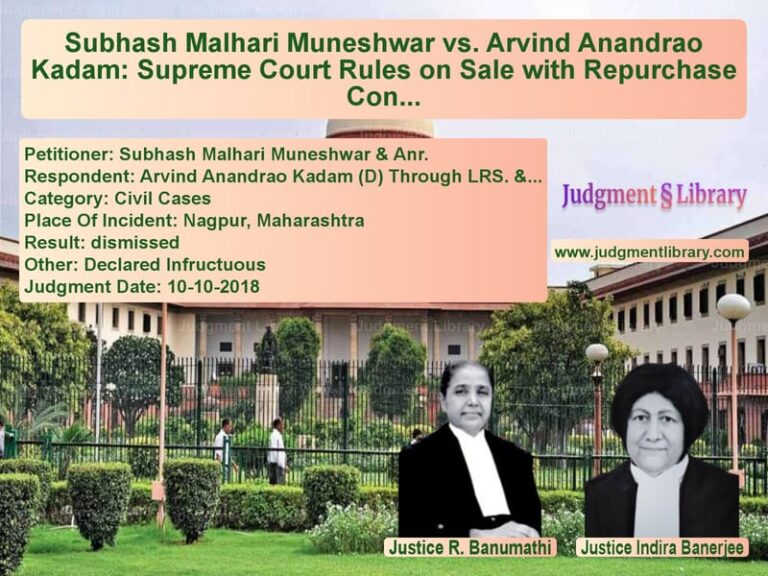Supreme Court Upholds Arbitration Clause in Multimodal Transport Contract Dispute
The Supreme Court of India recently delivered a crucial ruling in a dispute concerning the enforcement of an arbitration clause in a multimodal transport contract. The case involved M/S Caravel Shipping Services Pvt. Ltd. (the appellant) and M/S Premier Sea Foods Exim Pvt. Ltd. (the respondent), arising from a bill of lading executed between the parties.
The apex court ruled in favor of the appellant, emphasizing the importance of arbitration agreements incorporated into commercial contracts, even when the arbitration clause is in a printed format. This decision reinforced the principle that arbitration should be the preferred mode of dispute resolution in contractual matters, particularly in the context of international trade and transportation.
Background of the Case
The dispute originated from a document titled “Multimodal Transport Document/Bill of Lading” dated October 25, 2008. This bill of lading was issued by the appellant, Caravel Shipping Services Pvt. Ltd., as the transport agent facilitating the shipment for the respondent, Premier Sea Foods Exim Pvt. Ltd. The bill of lading contained an arbitration clause printed in its terms, requiring disputes to be resolved through arbitration.
The respondent, Premier Sea Foods Exim Pvt. Ltd., filed a civil suit before the Sub-Judge’s Court in Kochi, seeking recovery of ₹26,53,593. The appellant, in response, filed an application under Section 8 of the Arbitration and Conciliation Act, 1996, arguing that the dispute should be referred to arbitration in accordance with the terms of the bill of lading.
Key Issues Raised
- Did the printed arbitration clause in the bill of lading constitute a binding arbitration agreement under Indian law?
- Was the respondent obligated to resolve the dispute through arbitration rather than litigation?
- Should the courts intervene in commercial contracts that explicitly include arbitration clauses?
Arguments of the Petitioner (Caravel Shipping Services Pvt. Ltd.)
- The appellant contended that the bill of lading explicitly incorporated an arbitration clause, which was binding on both parties.
- Under Section 7(5) of the Arbitration and Conciliation Act, 1996, the contract made a reference to the arbitration clause, making it a valid agreement.
- The appellant relied on the precedent set in M.R. Engineers and Contractors Private Limited v. Som Datt Builders Limited, where the Supreme Court held that reference to an arbitration clause in a contractual document is sufficient to bind the parties.
- The appellant argued that allowing the civil suit to proceed would violate the principles of arbitration, which aim to provide an efficient dispute resolution mechanism.
Arguments of the Respondent (Premier Sea Foods Exim Pvt. Ltd.)
- The respondent argued that the arbitration clause was merely a printed condition and was not specifically agreed upon by both parties.
- Under Section 7(4)(a) of the Arbitration Act, an arbitration agreement must be signed by both parties, which was not the case with the bill of lading.
- The respondent contended that since the bill of lading was not signed by them, they were not bound by the arbitration clause.
- They further argued that since the civil suit was already at an advanced stage, the arbitration request should not be entertained.
Supreme Court’s Analysis
The Supreme Court carefully examined the nature of the arbitration clause and the contractual obligations of the parties. The key findings included:
- The bill of lading explicitly stated that all terms, including printed ones, were binding on the parties.
- Section 7(3) of the Arbitration Act requires an arbitration agreement to be in writing but does not mandate that it be signed.
- In Jugal Kishore Rameshwardas v. Mrs. Goolbai Hormusji, the Supreme Court held that an arbitration agreement need not be signed, provided it is in writing and referenced in the contract.
- The Court emphasized that commercial contracts should be interpreted in a manner that upholds the intention of the parties to resolve disputes through arbitration.
The Court observed:
“An arbitration agreement does not require a signature to be valid. As long as the contract references the arbitration clause, and both parties have acted upon it, it is binding.”
Final Judgment
The Supreme Court ruled in favor of Caravel Shipping Services Pvt. Ltd. and issued the following directives:
- The judgments of the lower courts dismissing the arbitration application were set aside.
- The dispute between the parties was referred to arbitration in accordance with the bill of lading.
- The ongoing civil suit was stayed pending the outcome of the arbitration.
The judgment concluded:
“This Court reaffirms that arbitration clauses in commercial contracts should be given full effect, and courts should not allow parties to bypass arbitration agreements by filing civil suits.”
Implications of the Judgment
This ruling has significant implications for commercial contracts and arbitration law in India:
- Enforceability of Arbitration Clauses: The judgment clarifies that an arbitration clause does not need to be signed to be valid.
- Strengthening Alternative Dispute Resolution (ADR): The ruling reinforces India’s commitment to promoting arbitration as an effective mechanism for resolving commercial disputes.
- Judicial Deference to Arbitration: Courts should respect arbitration agreements and refer disputes to arbitration where applicable.
- Commercial Clarity: Businesses must ensure that their contracts explicitly reference arbitration clauses to prevent unnecessary litigation.
This decision marks a significant step toward ensuring that commercial contracts are honored and that arbitration remains a robust and efficient means of dispute resolution.
Petitioner Name: M/S Caravel Shipping Services Pvt. Ltd..Respondent Name: M/S Premier Sea Foods Exim Pvt. Ltd..Judgment By: Justice R.F. Nariman, Justice Navin Sinha.Place Of Incident: Kochi, Kerala.Judgment Date: 29-10-2018.
Don’t miss out on the full details! Download the complete judgment in PDF format below and gain valuable insights instantly!
Download Judgment: MS Caravel Shipping vs MS Premier Sea Food Supreme Court of India Judgment Dated 29-10-2018.pdf
Direct Downlaod Judgment: Direct downlaod this Judgment
See all petitions in Arbitration Awards
See all petitions in Institutional Arbitration
See all petitions in Dispute Resolution Mechanisms
See all petitions in Judgment by Rohinton Fali Nariman
See all petitions in Judgment by Navin Sinha
See all petitions in allowed
See all petitions in Quashed
See all petitions in supreme court of India judgments October 2018
See all petitions in 2018 judgments
See all posts in Arbitration and Alternate Dispute Resolution Category
See all allowed petitions in Arbitration and Alternate Dispute Resolution Category
See all Dismissed petitions in Arbitration and Alternate Dispute Resolution Category
See all partially allowed petitions in Arbitration and Alternate Dispute Resolution Category







